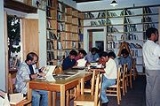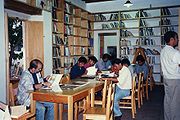
Adult education
Encyclopedia

Folk high school
Folk high schools are institutions for adult education that generally do not grant academic degrees, though certain courses might exist leading to that goal...
s, community college
Community college
A community college is a type of educational institution. The term can have different meanings in different countries.-Australia:Community colleges carry on the tradition of adult education, which was established in Australia around mid 19th century when evening classes were held to help adults...
s, and lifelong learning centers. The practice is also often referred to as 'Training and Development 'and is often associated with workforce or professional development
Professional development
Professional development refers to skills and knowledge attained for both personal development and career advancement. Professional development encompasses all types of facilitated learning opportunities, ranging from college degrees to formal coursework, conferences and informal learning...
. It has also been referred to as andragogy
Andragogy
Andragogy consists of learning strategies focused on adults. It is often interpreted as the process of engaging adult learners with the structure of learning experience. The term ‘andragogy’ has been used in different times and countries with various connotations. Nowadays there exist mainly three...
(to distinguish it from pedagogy
Pedagogy
Pedagogy is the study of being a teacher or the process of teaching. The term generally refers to strategies of instruction, or a style of instruction....
). Adult education is different from vocational education, which is mostly workplace-based for skill improvement; and also from non-formal adult education, including learning skills or learning for personal development.
In 1926 the American Library Association study Libraries and Adult Education was published and the association established the Board on Library and Adult Education (later the Adult Education Board) with reports in the
ALA Bulletin. The concept of the library as an agency of ongoing education for adults became firmly established in U.S. society. In her historical review of libraries and adult education, Margaret E. Monroe (1963: 6) identified a variety
of library services provided by libraries to adults during the first half of the twentieth century that incorporated aspects of adult education. Many libraries have a literacy center, either within their community or in the building; others offer on-site tutoring for adults, or at least space for tutors to meet with students. Family literacy programs are also quite popular within libraries and schools. Roehrig, L. (2010).
The U.S. Institute of Museum and Library Services helps create vibrant, energized learning communities recognizing that "Our achievement as individuals and our success as a democratic society depends on learning continually, adapting to change readily, and evaluating information critically."
Characteristics
Programs provide one-to-one tutoring and small group sessions for adults at the 6th grade level or below. Public libraries, nonprofit organizations and school systems administer these programs across the country. Many adult education centers from community colleges receive grants from Welfare and Unemployment departments to offer training to welfare and unemployment recipients to help these individuals gain life and work skills to facilitate their return to the mainstream. They also provide programs for ex-offenders to reintegrate to society.Educating adults differs from educating children in several ways. One of the most important differences is that adults have accumulated knowledge, work experience or military service that can add to the learning experience. Another difference is that most adult education is voluntary, therefore, the participants are generally better motivated.
Adults frequently apply their knowledge in a practical fashion to learn effectively. They must have a reasonable expectation that the knowledge recently gained will help them further their goals. One example, common in the 1990s, was the proliferation of computer training courses in which adults (not children or adolescents), most of whom were office workers, could enroll. These courses would teach basic use of the operating system
Operating system
An operating system is a set of programs that manage computer hardware resources and provide common services for application software. The operating system is the most important type of system software in a computer system...
or specific application software. Because the abstractions governing the user's interactions with a PC
Personal computer
A personal computer is any general-purpose computer whose size, capabilities, and original sales price make it useful for individuals, and which is intended to be operated directly by an end-user with no intervening computer operator...
were so new, many people who had been working white-collar jobs for ten years or more eventually took such training courses, either at their own whim (to gain computer skills and thus earn higher pay) or at the behest of their managers.
In the United States, a more general example, and stereotypical, is that of the high-school dropout who returns to school to complete general education requirements. Most upwardly-mobile positions require at the very least a high school
High school
High school is a term used in parts of the English speaking world to describe institutions which provide all or part of secondary education. The term is often incorporated into the name of such institutions....
diploma or equivalent. A working adult is unlikely to have the freedom to simply quit his or her job and go "back to school" full time. Public school systems and community colleges usually offer evening or weekend classes for this reason. In Europe this is often referred to as "second-chance", and many schools offer tailor-made courses and learning programs for these returning learners.
Those adults who read at the very lowest level get help from volunteer literacy programs. These national organizations provide training, tutor certification, and accreditation for local volunteer programs. States often have state organizations such as Literacy Florida!Inc., which provide field services for volunteer literacy programs.
In the U.S.A., the equivalent of the high school diploma earned by an adult through these programs is to pass the General Education Development (GED
GED
General Educational Development tests are a group of five subject tests which, when passed, certify that the taker has American or Canadian high school-level academic skills...
) test.
Another fast-growing sector of adult education is English for Speakers of Other Languages (ESOL), also referred to as English as a Second Language (ESL) or English Language Learners (ELL). These courses are key in assisting immigrants with not only the acquisition of the English language, but the acclimation process to the culture of the United States.
A common problem in adult education in the U.S. is the lack of professional development opportunities for adult educators. Most adult educators come from other professions and are not well trained to deal with adult learning issues. Most of the positions available in this field are only part-time without any benefits or stability since they are usually funded by government grants that might last for only a couple of years.
See also
- Adult high schoolAdult high schoolAn adult high school or adult school is a high school facility designed for adult education. It is intended for adults who have not completed high school to continue their education. Some adult high schools offer child care, special integration programs for immigrants and refugees, career...
- Bullying in adult education
- Community collegeCommunity collegeA community college is a type of educational institution. The term can have different meanings in different countries.-Australia:Community colleges carry on the tradition of adult education, which was established in Australia around mid 19th century when evening classes were held to help adults...
in Canada and the United States - Community EducationCommunity educationCommunity education, also known as Community-based education or Community learning & development, is defined by the Scottish Government as learning and social development work with individuals and groups in their communities using a range of formal and informal methods...
in ScotlandScotlandScotland is a country that is part of the United Kingdom. Occupying the northern third of the island of Great Britain, it shares a border with England to the south and is bounded by the North Sea to the east, the Atlantic Ocean to the north and west, and the North Channel and Irish Sea to the... - Continuing educationContinuing educationContinuing education is an all-encompassing term within a broad spectrum of post-secondary learning activities and programs. The term is used mainly in the United States and Canada...
- Distance learning
- E-learningE-learningE-learning comprises all forms of electronically supported learning and teaching. The information and communication systems, whether networked learning or not, serve as specific media to implement the learning process...
- Environmental adult educationEnvironmental adult educationEnvironmental Adult Education is recognized as a “hybrid outgrowth of the environmental movement and adult education, combining an ecological orientation with a learning paradigm to provide a vigorous educational approach to environmental concerns” .In laymen’s terms, environmental adult education...
- Folk high schoolFolk high schoolFolk high schools are institutions for adult education that generally do not grant academic degrees, though certain courses might exist leading to that goal...
in Scandinavia and Germany - Folkbildning community education through learning circles in Scandinavia
- HeutagogyHeutagogyIn education, heutagogy, a concept coined by Stewart Hase of Southern Cross University in Australia, is the study of self-determined learning. The notion is an expansion and reinterpretation of andragogy, and it is possible to mistake it for the same...
- Illiteracy
- Life skillsLife skillsLife skills are problem solving behaviors used appropriately and responsibly in the management of personal affairs. They are a set of human skills acquired via teaching or direct experience that are used to handle problems and questions commonly encountered in daily human life...
- Lifelong learningLifelong learningLifelong learning is the continuous building of skills and knowledge throughout the life of an individual. It occurs through experiences encountered in the course of a lifetime...
- International Society for Comparative Adult EducationInternational Society for Comparative Adult EducationThe International Society for Comparative Adult Education is a network of individuals and organizations with members in more than thirty countries.-Purpose:...
- Open UniversityOpen UniversityThe Open University is a distance learning and research university founded by Royal Charter in the United Kingdom...
- Part-Time LearnerPart-Time LearnerPart-Time Adult Learner also Part-Time Learner refers to a subset of non-traditional learner who pursues higher education, typically after reaching physical maturity, while living off-campus, and possessing responsibilities related to family and/or employment...
- Remedial educationRemedial educationPostsecondary remedial education is a large and growing segment of higher education in the United States...
- Scuola seraleScuola seraleThe Scuola Serale in its classic is an institution structured tool for education and training of human and professional adults, and is modern as a moment of reflection that allows the adult learner is seeking to challenge himself, gaining awareness of its problems and planning the...
in Italy
Educators
- Paulo FreirePaulo FreirePaulo Reglus Neves Freire was a Brazilian educator and influential theorist of critical pedagogy.-Biography:...
- Malcolm KnowlesMalcolm KnowlesMalcolm Shepherd Knowles was an American Adult Educator, famous for the adoption of the theory of Andragogy—initially a term coined by the German teacher Alexander Kapp...
- Eduard C. LindemanEduard C. LindemanEduard C. Lindeman was an American educator, notable for his pioneering contributions in adult education. He introduced many concepts of modern adult education in his book, The Meaning of Adult Education.-Background:...
- Albert MansbridgeAlbert MansbridgeAlbert Mansbridge was a British educator who organized the adult education movement in Britain. He is best known for founding the Workers' Educational Association in England in 1903...
- John DeweyJohn DeweyJohn Dewey was an American philosopher, psychologist and educational reformer whose ideas have been influential in education and social reform. Dewey was an important early developer of the philosophy of pragmatism and one of the founders of functional psychology...
External links
- International Council for Adult Education (ICAE)
- European Association for the Education of Adults (EAEA)
- Adult Literacy Education (USA)
- The Council for Adult and Experiential Learning (USA)
- UNESCO Institute for Lifelong Learning (UIL)
- National Center for the Study of Adult Learning and Literacy (NCSALL U.S.)
- Adult Education in Ireland
- American Society for Training & Development (ASTD)
- BBC Adult Learners resources
- http://eff.cls.utk.edu/fundamentals/eff_standards.htm

